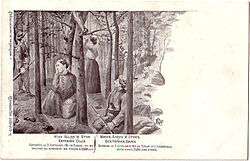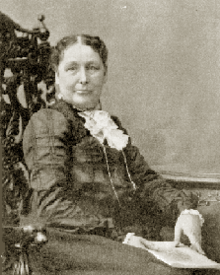Miss Stone Affair
The Miss Stone Affair (Bulgarian: Афера „Мис Стоун“, Macedonian: „Афера Мис Стон“) was the kidnapping of American Protestant missionary Ellen Maria Stone and her pregnant Bulgarian fellow missionary and friend Katerina Cilka by the Internal Macedonian Revolutionary Organization.[1]


History
In 1901, one of the main problems facing the Internal Macedonian Revolutionary Organization was the lack of resources for armaments. This financial crisis was discussed at the meeting of the leadership of IMRO in Kyustendil, Bulgaria that summer. At this meeting, Delchev argued that small robberies only tarnished the reputation of the organization and were not helpful to solving the financial problem. Gotse Delchev then authorized Mihail Gerdzhikov to carry out the kidnapping of a wealthy person or persons in Macedonia to obtain funds, but he failed. Delchev made two other unsuccessful attempts with wealthy Turks and Greeks. He later developed a plan to kidnap the son of Ivan Evstratiev Geshov, which also failed. Sandanski then offered to kidnap Ferdinand of Bulgaria during his visit to the Rila Monastery, but this radical plan was opposed by Delchev, who believed that the abduction must be done on Ottoman territory. Chernopeev and Sandanski discussed the kidnapping of a wealthy Turk near Simitli, but this plan was not realised. Yane Sandanski, Hristo Chernopeev and Sava Mihaylov prepared a plan for the kidnapping of Süleyman Bey, but due to his illness this action also failed.
Sandanski was then drawn to the idea of kidnapping a Protestant missionary of Bansko. A detachment led by the voivoda Yane Sandanski and the sub-voivodas Hristo Chernopeev and Krǎstyo Asenov carried this out on August 21st, 1901. Two women—Ellen Maria Stone and her fellow missionary Katerina Stefanova-Cilka—were kidnapped somewhere between Bansko and Gorna Dzhumaya, then towns in the Ottoman Empire.
The goal of the kidnapping was to receive a heavy ransom and aid the financially struggling IMRO. The detachment was pursued by the Ottoman and Bulgarian authorities and by a cheta of the contending organization Supreme Macedonian Committee. Ottoman authorities for a short time, arrested Grigor Cilka, husband of Katerina on unfounded charges of being complicit in the kidnapping.[2][3][4] Sometimes regarded as a case of the Stockholm syndrome (with the kidnappers even assisting Cilka in giving birth to her daughter), the affair ended after intensive negotiations in early 1902, half a year after the kidnapping. IMRO was paid a ransom of 14,000 Turkish gold liras on January 18th, 1902 in Bansko, and the hostages were released on February 2nd near Strumica.
Widely covered by the media at the time, the event has been often dubbed "America's first modern hostage crisis".
References
- Marcel Cornis-Pope, John Neubauer eds., History of the Literary Cultures of East-Central Europe: Junctures and disjunctures in the 19th and 20th centuries, Volume 2, John Benjamins Publishing, 2006, ISBN 9027293406, p. 361.
- Perry, Duncan M. (1988). The Politics of Terror: The Macedonian Liberation Movements, 1893-1903. Duke University Press. p. 104. ISBN 9780822308133.CS1 maint: ref=harv (link)
- Daniel, Robert L. (1970). American philanthropy in the Near East, 1820-1960. Ohio University Press. p. 135. ISBN 9780821400630.CS1 maint: ref=harv (link)
- Sherman, Laura Beth (1980). Fires on the Mountain: The Macedonian Revolutionary Movement and the Kidnapping of Ellen Stone. East European Monographs. p. 89. ISBN 9780914710554.CS1 maint: ref=harv (link)
Further reading
- Пандев, Константин (1983). Аферата "Мис Стоун". Спомени, документи и материали (in Bulgarian). Мая Вапцарова. София: Издателство на Отечествения фронт. OCLC 10725712.
- Carpenter, Teresa (2003). The Miss Stone Affair: America's First Modern Hostage Crisis!. Simon & Schuster. ISBN 978-0-7432-0055-4.
- Cochran, Richard M. (2014). Katerina Stephanova Tsilka (PDF). Institute for Albanian & Protestant Studies.
- Some archive photos concerning the case.